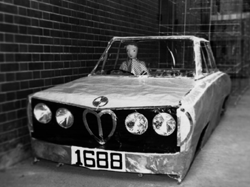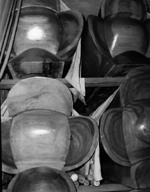Funereal fare
Discover what Chinese customs hold in store for
death - the ultimate, once-in-a-lifetime experience
By Wanda Lam
To the Chinese, rites are manifold and everywhere. Even death brings forth several of these gems of tradition and custom.
All these rituals usually involve a funeral parlour - a company that provides services for funerals.
Among their major concerns are, of course, coffins.
"Making Chinese coffins is different from making Western ones. The former requires greater skill," said Mr. Leung Chau Wai, manager of the Fortuna Funeral Parlour at Hung Hom.
"There is not a single nail in a Chinese coffin. All the joints are tightly fitted instead. It takes three to four years for an apprentice to be completely trained on this job."
The price of coffins ranges from a few thousand to about $30,000, depending on the materials used.
"Besides coffins, lots of things are needed in a funeral. There are altars, tombstones and sau yi (clothing for the deceased), just to name a few. The prices vary greatly. For example, the offerings on the altar can cost as much as $1,600, or as little as $300," Mr. Leung said.
"The reason why people want the most expensive things is that they want the ceremony to look splendid. They may also feel like they are doing their best for the dead," he added.
That explains why a customer may want to have a funeral held in a large hall, where the rent may be $7,000, while that of an upstairs room might cost only $800. By the same token, some people may want gold-plated columbariums, which cost about $2,000, for their deceased relatives.
Besides preparing offerings for the dead, the Chinese belief that the dead are stilling "living" in another world can be illustrated by the Taoist practice of burning paper-made necessities for the dead. These objects are for the use of the deceased in the afterlife.
Mr. Lau Yan On of Cheung Gei Paper Works has been making paper models for 10 years. He makes paper cars, paper houses and even paper servants. These are burnt, hoping that the dead will receive them in another world.
"(Paper) cars and houses are what most people order. A miniature of a two-storeyed house with a garden will cost about $900 - and this only takes me 20 to 30 minutes to finish," Mr. Lau said.
 |
This paper BMW is not complete without a paper
chauffeur and a lucky license plate number to
bring good fortune in the afterlife. |
|
As time moves on, it seems logical that fewer people will indulge in this traditional ritual. However, Mr. Lau thinks that this is too hard a habit to break.
"Although it seems that people are less superstitious nowadays, our business turnover has not changed much over the years. In fact, many of our customers are young people who are here to buy paper products for their deceased parents.
"I reckon it is because fulfilling the custom makes them feel good - they can say to themselves that they have at least done something for their parents," Mr. Lau said.
|
"It is not a question of being superstitious or not. Rather people regard such practice as a necessary ceremony, through which they can show their care and respect for the dead. So long as such a mentality exists, there is room for survival for this profession."
Said a woman who has been a tailor of sau yi - garments for the dead - for 10 years:
 |
| Made-to-fit coffins stacked up. |
|
"People believe that the sau yi they are in at burial will be the clothes they will wear in the underworld. They think beautiful clothes will give Yim Lau Wong (king of the dead) a good impression, and he in turn will guarantee a better incarnation for them.
"Therefore, traditional Chinese people consider sau yi very important to their lives after death. Some old people come to buy their own sau yi - when they are still alive - because they are afraid that their descendants will not equip them with proper sau yi when death eventually comes around," said the tailor.
|
"There are other interesting things about sau yi. For example, they are much larger than needed to facilitate putting the clothes onto the dead body. If the clothes are too tight, the bones and joints of the body will have to be bent or broken in order to get the clothes on."
After the coffin and the clothing, cosmetics put a finishing touch on a complete funereal procession.
"Generally speaking, the body's eyes and mouths need to be closed," said Miss Mayme Chan, cosmetician and director of the Universal Funeral Parlour Co. Ltd.
"We have to clean up the body. Occasionally, if not often, we have to fix up the body, in case it is seriously deformed. For example, broken skin has to be sewn up and special cosmetics would be applied to cover up the scars.
"All these are done so as to make the body look acceptable," Miss Chan said.
This concern for the physical appearance of the deceased is also a major feature of funerals in Western countries, which have their own set of rituals.
Undertaking the taboo
In a society where "death" is a dirty word, undertakers find
using the d-word nothing special
By Wanda Lam
Death and taxes are both inevitable. However, in Hong Kong, everyone talks about taxes, and no one talks about death - since death has always been regarded as a taboo conversation topic.
Those whose work has to deal with this "horror" see their jobs to be like any other occupation, however.
"They are just furniture to me, there's nothing special," said Mr. Leung Chau Wai, manager of Fortuna Funeral Parlour at Hung Hom.
The furniture he pointed to were coffins.
Neither did cosmetician Mayme Chan regard her job of doing makeup for the dead as a frightening one.
"I do not think this job is disgusting, since I am quite indifferent to corpses. Perhaps it has something to do with my previous job, which was being a nurse in a hospital," said Miss Chan.
The main problem that worries coffin maker Leung, however, is the lack of people to carry on the heritage.
"Young people are reluctant to do the job because they cannot make much money from it. More important, they do not want to be associated with things that are related to the dead," Mr. Leung said.
"I have been in this field for more than 30 years," Mr. Leung said. "I started as a clerk, and now I am a manager of the parlour."
Mr. Leung's family has no objections..
"My family raises no objection regarding my job, Indeed, there is nothing special about it."
However, Mr. Leung sometimes feels the strained emotions brought about by death.
"Of course, sometimes I feel deeply sad when I meet clients who have lost their dearest. I once met a family of which the man of the household died. The members were shattered and heartbroken - and my tears could not help flowing," Mr. Leung said.
Miss Chan also meets no disapproval at home.
"My family does not object to my work," she said.
"To me, being a cosmetician for the dead is just like all other jobs. We also have to undertake special training, and I was trained in an American funeral parlour for about three months.
"Working as a cosmetician for the dead requires more than just skills. We have our own codes of ethics, too. It is forbidden to accept lai si (gifts of money) from the relatives of the dead, for instance. We are no different from other employees."
Return to contents

